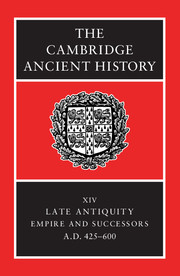Book contents
- Frontmatter
- PART I CHRONOLOGICAL OVERVIEW
- PART II GOVERNMENT AND INSTITUTIONS
- 6 Emperor and court
- 7 Government and administration
- 8 Administration and politics in the cities of the fifth to the mid seventh century: 425–640
- 9 Roman law
- 10 Law in the western kingdoms between the fifth and the seventh century
- 11 The army, c. 420–602
- PART III EAST AND WEST: ECONOMY AND SOCIETY
- PART IV THE PROVINCES AND THE NON-ROMAN WORLD
- PART V RELIGION AND CULTURE
- Conclusion
- Chronological Table
- BIBLIOGRAPHY
- Index
- References
10 - Law in the western kingdoms between the fifth and the seventh century
from PART II - GOVERNMENT AND INSTITUTIONS
Published online by Cambridge University Press: 28 March 2008
- Frontmatter
- PART I CHRONOLOGICAL OVERVIEW
- PART II GOVERNMENT AND INSTITUTIONS
- 6 Emperor and court
- 7 Government and administration
- 8 Administration and politics in the cities of the fifth to the mid seventh century: 425–640
- 9 Roman law
- 10 Law in the western kingdoms between the fifth and the seventh century
- 11 The army, c. 420–602
- PART III EAST AND WEST: ECONOMY AND SOCIETY
- PART IV THE PROVINCES AND THE NON-ROMAN WORLD
- PART V RELIGION AND CULTURE
- Conclusion
- Chronological Table
- BIBLIOGRAPHY
- Index
- References
Summary
Anyone seeking to write an account of law in the western kingdoms labours under two great difficulties. The student of Roman law can find comfort in the knowledge that his legal tradition was the creation of a political élite which prided itself upon its literary accomplishments. It was both a tool of government and one of the proudest manifestations of a literate culture. In the post- and non-Roman kingdoms, such comfortable assurance is only forthcoming in modest portions. The study of Roman law rests upon rich materials that have been analysed by some of the best minds of every generation since, in the eleventh century, Irnerius set out to teach the law of Justinian at Bologna. The written materials for a history of law in the western kingdoms are, however, much patchier and their relationship to the practice of law more uncertain.
The second great difficulty is partly a consequence of the first: the almost irresistible temptation to judge all other laws in late antiquity by their relationship to Roman law. Moreover, this temptation may take a particularly pernicious form if one is induced to think of Roman law as, in some sense, ‘modern’ in outlook, so that the other laws can then be judged as relatively modern or primitive according to how closely they resembled Roman law. One form of this dangerous preoccupation is the ancient conception – already well expressed, for his own purposes, by Cassiodorus – of the culture of Europe as a fruitful mixture of Roman and Germanic (or Gothic).
- Type
- Chapter
- Information
- The Cambridge Ancient History , pp. 260 - 287Publisher: Cambridge University PressPrint publication year: 2001

